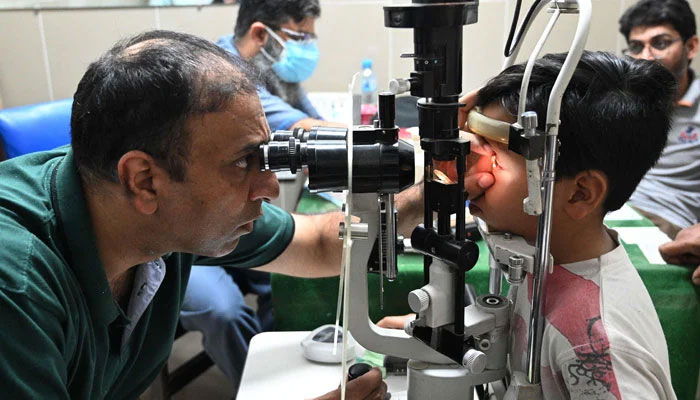AST demands compulsory eye screening in schools
Rawalpindi:Al-Shifa Trust has called for mandatory eye screenings in schools, stressing that early detection and treatment of vision problems can significantly reduce the risk of childhood blindness.
Speaking to the media, President of Al-Shifa Trust Major General (r) Rehmat Khan said that while some eye health initiatives exist, they are not mandated by national policy and mainly depend on periodic campaigns or voluntary participation. This, he emphasized, is not enough to address the growing burden of childhood vision issues.
He announced that a formal letter would soon be sent to provincial and federal governments, urging the implementation of a coordinated national eye screening program in all schools and madrassas. Apart from the developed world, some countries in Latin America and South East Asia have successfully reduced childhood blindness through compulsory school eye examinations. Pakistan still lacks such a national program, he said.
He added that Al-Shifa Trust had already taken significant steps in this direction, screening over 175,000 schoolchildren in the past year through more than 550 free eye camps in underserved communities. The trust aims to reach over two million patients and perform more than 120,000 eye surgeries in the coming year, he informed.
On one hand, many patients cannot afford treatment, and on the other, there are people with the resources to help. Now is the time for those who can help to come forward, said Rehmat Khan. He also highlighted the trust’s expansion plans, which include new hospitals in Lahore, Haveli Lakha, and Gilgit, as well as a dedicated Eye Cancer Centre in Lahore.
Chief of Medical Services at Al-Shifa Trust Eye Hospital Professor Dr. Wajid Ali Khan underscored the scale of the challenge. With over 250 million people in Pakistan, more than half of whom are children and adolescents, no single organization can handle the country’s entire eye care burden.
He proposed a collaborative national strategy, suggesting that every medical college adopt a district and take responsibility for eye screening programs among vulnerable populations. Al-Shifa’s screening data revealed that 10 per cent of children had convergence insufficiency, congenital cataracts and myopia, a common condition in which light is not properly focused on the retina.
Dr. Wajid said that an effective school-based eye health program should include trained health workers in every school or provide basic training to teachers to identify vision issues and refer children for specialised care if needed. Early intervention, he stressed, can prevent permanent vision loss and significantly improve educational outcomes.
With public support and government commitment, Pakistan can move toward eliminating avoidable childhood blindness, securing a healthier future for the next generation, he said. Nearly 80 per cent of patients across trust’s facilities in Rawalpindi, Chakwal, Kohat, Sukkur, Muzaffarabad, and Gilgit receive free treatment.
-
 Patriots' WAGs Slam Cardi B Amid Plans For Super Bowl Party: She Is 'attention-seeker'
Patriots' WAGs Slam Cardi B Amid Plans For Super Bowl Party: She Is 'attention-seeker' -
 Martha Stewart On Surviving Rigorous Times Amid Upcoming Memoir Release
Martha Stewart On Surviving Rigorous Times Amid Upcoming Memoir Release -
 Prince Harry Seen As Crucial To Monarchy’s Future Amid Andrew, Fergie Scandal
Prince Harry Seen As Crucial To Monarchy’s Future Amid Andrew, Fergie Scandal -
 Chris Robinson Spills The Beans On His, Kate Hudson's Son's Career Ambitions
Chris Robinson Spills The Beans On His, Kate Hudson's Son's Career Ambitions -
 18-month Old On Life-saving Medication Returned To ICE Detention
18-month Old On Life-saving Medication Returned To ICE Detention -
 Major Hollywood Stars Descend On 2026 Super Bowl's Exclusive Party
Major Hollywood Stars Descend On 2026 Super Bowl's Exclusive Party -
 Cardi B Says THIS About Bad Bunny's Grammy Statement
Cardi B Says THIS About Bad Bunny's Grammy Statement -
 Sarah Ferguson's Silence A 'weakness Or Strategy'
Sarah Ferguson's Silence A 'weakness Or Strategy' -
 Garrett Morris Raves About His '2 Broke Girls' Co-star Jennifer Coolidge
Garrett Morris Raves About His '2 Broke Girls' Co-star Jennifer Coolidge -
 Winter Olympics 2026: When & Where To Watch The Iconic Ice Dance ?
Winter Olympics 2026: When & Where To Watch The Iconic Ice Dance ? -
 Melissa Joan Hart Reflects On Social Challenges As A Child Actor
Melissa Joan Hart Reflects On Social Challenges As A Child Actor -
 'Gossip Girl' Star Reveals Why She'll Never Return To Acting
'Gossip Girl' Star Reveals Why She'll Never Return To Acting -
 Chicago Child, 8, Dead After 'months Of Abuse, Starvation', Two Arrested
Chicago Child, 8, Dead After 'months Of Abuse, Starvation', Two Arrested -
 Travis Kelce's True Feelings About Taylor Swift's Pal Ryan Reynolds Revealed
Travis Kelce's True Feelings About Taylor Swift's Pal Ryan Reynolds Revealed -
 Michael Keaton Recalls Working With Catherine O'Hara In 'Beetlejuice'
Michael Keaton Recalls Working With Catherine O'Hara In 'Beetlejuice' -
 King Charles, Princess Anne, Prince Edward Still Shield Andrew From Police
King Charles, Princess Anne, Prince Edward Still Shield Andrew From Police




